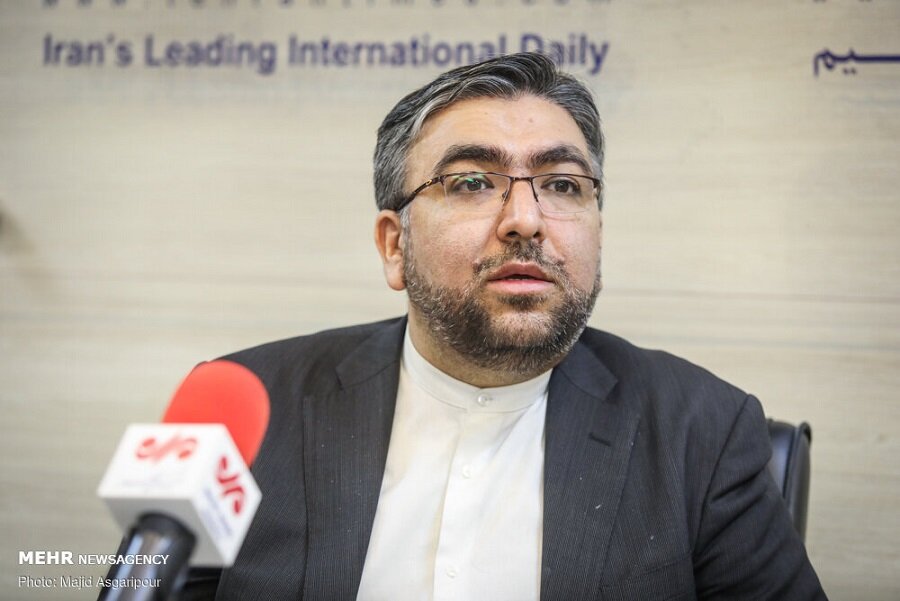

TEHRAN – A senior member of the Iranian Parliament (Majlis) says increasing the level of uranium enrichment to 60% shows that Iran’s nuclear technology is “too strong” to be stopped by a sabotage act.
“Through enrichment to 60%, Iran shows that its capacity for nuclear knowledge is too strong to be stopped by a sabotage and that Iran has the ability to rely on indigenous knowledge to meet its needs,” Abolfazl Amouei tells the Tehran Times.
At 00:40 midnight on Friday, April 16, the young Iranian scientists were able to enrich uranium to 60 percent purity, Parliament Speaker Mohammad Bagher Ghalibaf said in a message on his Twitter account.
The move came as a response to the Israeli sabotage operation at the Natanz nuclear facility in Isfahan province.
“According to the act of “Strategic Action to Lift the Sanctions and Protect the Interests of the Iranian Nation,” the Atomic Energy Organization is assigned to keep on enriching uranium at any level to meet the peaceful needs of the country,” emphasizes Amouei, the spokesman for the Iranian Parliament National Security and Foreign Policy Committee.
Following is the text of the interview:
Q: Could you update us about what happened at the Natanz facility?
A: The Natanz incident occurred as a result of a sabotage operation that caused electricity outage. On the one hand, we consider this incident as a terrorist act that comes under “nuclear terrorism”.
On the other hand, since this attack took place on a site that is operating under the nuclear safeguard regime, it can be classified as a “crime against humanity”. Under international law, military action against these sites is prohibited because radioactive leaks can have devastating effects on people.
Therefore, this is a criminal act. Although no leakage of radioactive has occurred on the site, Iran will pursue this issue at the international bodies due to the possible consequences of this sabotage operation. The Iranian foreign minister has written a letter to the UN secretary-general. There is evidence that the Zionist regime was involved in this action.
Q: Iranian officials have accused Israel of the sabotage operation in Natanz. Some believe that enriching uranium to 60% is a response to sabotage. What is your view?
A: According to the act of “Strategic Action to Lift the Sanctions and Protect the Interests of the Iranian Nation,” the Atomic Energy Organization is assigned to keep on enriching uranium at any level to meet the peaceful needs of the country. To that end, while our country needs molybdenum to supply some radiopharmaceuticals, producing this substance requires enrichment to 60%.
Under these circumstances, we made a political decision to start producing the molybdenum, which is a must for Iran at this time. For this reason, we gave a clear answer to the enemies that the capability of the Islamic Republic is not limited, and even after the sabotage operation, the enrichment at the Natanz site did not stop at all.
Due to the power outage, a number of centrifuges ran into problems that can be recovered.
However, the Islamic Republic is determined to continue this path with more power and replace the damaged centrifuges with more advanced ones.
With the start of enrichment to 60%, Iran shows that its capacity for nuclear knowledge is too strong to be stopped by sabotage and that Iran has the ability to rely on indigenous knowledge to meet its needs.
Q: The Natanz incident took place in the midst of nuclear deal talks between Iran and the P4 +1 group in Vienna. The Iranian foreign minister said the incident was aimed at weakening Iran’s negotiating position. Do you think the incident can negatively affect the nuclear deal talks in Vienna? Given that this incident took place after the Mossad chief visited the United States and on the same day that the American secretary of defense visited Israel, do you think the United States was also involved in the Natanz incident?
A: Some analysts point to the role of the United States in the Natanz incident. In our view, the reactions of Western countries to the Natanz incident have not been constructive. Instead of worrying about sabotage at a nuclear site, European countries have expressed concern about Iran’s 60% enrichment for radiopharmaceutical production. This shows a double standard in European behavior, which is quite disappointing.
Despite claiming that the policy of maximum pressure on Iran has failed, the United States has refused to condemn the Israeli operation and is trying to use it as a political card against Iran, but this dream will never come true.
There are reports about the coordination of the Zionist regime and the United States, but we have not yet seen an official position from them, although we do not allow the Americans to take advantage of the Israeli sabotages in the political negotiations.
Therefore, we are completely distrustful of the intention of the United States to return to its commitments. That is why we will not lose our cards on the table until the United States returns to its (nuclear deal) commitments. We are waiting for them to return to their commitments first and to lift the sanctions completely.
Iran will then conduct a thorough verification of the lifting of sanctions before a return to its obligations under the JCPOA to demonstrate its commitment to international agreements. Otherwise, the U.S. proposals are not acceptable to us. But we feel that the Biden administration, despite giving different slogans, still intends to follow Trump’s policies in the face of Iran.
Related posts:
Views: 0
 RSS Feed
RSS Feed

















 April 23rd, 2021
April 23rd, 2021  Awake Goy
Awake Goy  Posted in
Posted in  Tags:
Tags: 
















